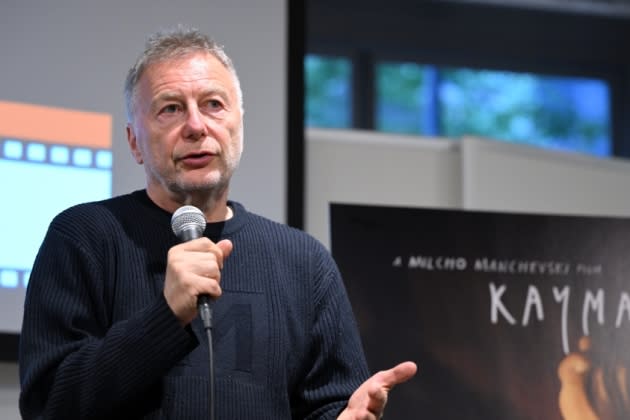Milcho Manchevski’s Tokyo Masterclass Is an Uncompromising Mix of Ice and Fire

Milcho Manchevski perfectly performed the role of art house celebrity at the Tokyo International Film Festival on Thursday, when he gave a masterclass that was eloquent, humorous, defiant and vaguely threatening.
He is in Tokyo, not only as a star guest, but also as director of competition film “Kaymak.” The film, which Manchevski describes as a love story for grown-ups, is a darkly comedic tale of two middle class couples in North Macedonia. There is commentary about intra-European politics and religion, but mostly it stirred Tokyo audiences with some uncompromising sex scenes.
More from Variety
The session started quietly enough with the “Before the Rain” director showing a five-minute short film he made in Cuba that uses extreme slow motion. “The concept was about trying to bring the viewer to a position where they’re not sure whether the image is moving or not,” he said. The exercise, he said was intended to help the audience reflect on story, emotion and our mental process while watching.
“The funny thing is the film has won a number of awards, but my favorite probably is the award for editing. Because there’s only one cut,” he deadpanned.
The Tokyo festival’s programming director Ichiyama Shozo was on hand to praise and tease the director into indiscretions. But Manchevski didn’t need much prodding.
“All the short films I was doing were sort of trying to buy time and trying to learn the craft,” he tossed out when asked about “Before the Rain,” an astonishing first feature which won Venice’s Golden Lion. “And for those of you who are students of filmmaking who want to be filmmakers, my recommendation is to shoot, shoot, shoot. Shoot more. Make films rather than talk about them.”
“Before the Rain” is constructed as three separate parts, which are seemingly simple and seemingly separate, but eventually merge into a complex whole.
After dashing off the script in his adopted New York home Manchevski pulled the film together quickly in large measure due to the support of the now defunct British Screen. “But once it all got rolling there were a lot of problems stemming from poor organization and the film was almost cancelled,” Manchevski recalled. “The Macedonian producers ended up doing the work that English producers could not.”
The film lost another key financier, the U.K.’s Channel Four two weeks into production. That was followed by the exit of acclaimed cinematographer, Darius Khondji. “He felt it was too difficult to achieve. It’s good that he pulled out because otherwise we’d still be there,” said Manchevski without a flicker.
“Winning [the Golden Lion] certainly influenced my career. Overnight, everything changed. One day, I was pretty much unemployed. The next I was getting offers from Robert Redford and Brad Pitt,” he said.
“It took me a few years to realize that I cannot make the kinds of films that I wanted to make within the Hollywood studio system. It just wasn’t for me. I appreciate much better the European relationship that audience has with the artist.
Manchevski’s second film “Dust” with a budget of £10 million ($12 million) came seven years later. “It wasn’t really a matter of the budget. It was a matter of matching the budget with an unconventional script,” he explained.
“In the beginning, Miramax, Harvey Weinstein’s company was financing the film and Robert Redford was producing. Then I had a disagreement and took the project back.” “I” not “we.”
“It took me six years to finance it again, this time as a European coproduction based in London, but that at least meant that there was not going to be interference from producers and distributors in the creative decisions,” said Manchevski.
Remembering that the Tokyo masterclass audience may not be familiar with the intricacies of European co-productions, Manchevski dispensed a mix of solid advice, zinging one-liners and other insightful trips down memory lane.
“I like new challenges. I think, especially for artists, that keeps you awake and keeps you alive,” Manchevshi said in response to a question about genre infidelity. “And as an artist, it’s essential that you play like a child. But then you’re very disciplined in executing.”
“Pretty much every nationality is violent to each other [in “Dust”], he said shooting down a lazy question that appeared to seek a pat generalization. “It is not the nations, but the individuals. Macedonians, Turks, Greeks, Americans all blow each other’s brains out,” he said to gasps from the audience.
“However, Bergman said film is great medium for ritualizing violence. Not glorifying, but ritualizing violence. The question is ‘what do you do with it?’ ” said Manchevski. “A film that makes violence seem repulsive serves a social function, unlike an action film which makes it seem fun.”
Another audience softball got batted back with a telling insight into Manchevski’s process. After urging an aspiring actor to hone his craft skills, Manchevski unpacked more of his answer. “We always spend a lot of time on casting. Many months, in which we are essentially looking at their craft skills. Then we rehearse before filming for about three weeks. So that by the time we get to the set everything is pretty much set,” said Manchevski. “[An actor’s] energy and looks are somewhat important, but not so much.”
Best of Variety
Sign up for Variety’s Newsletter. For the latest news, follow us on Facebook, Twitter, and Instagram.

 Yahoo Movies
Yahoo Movies 